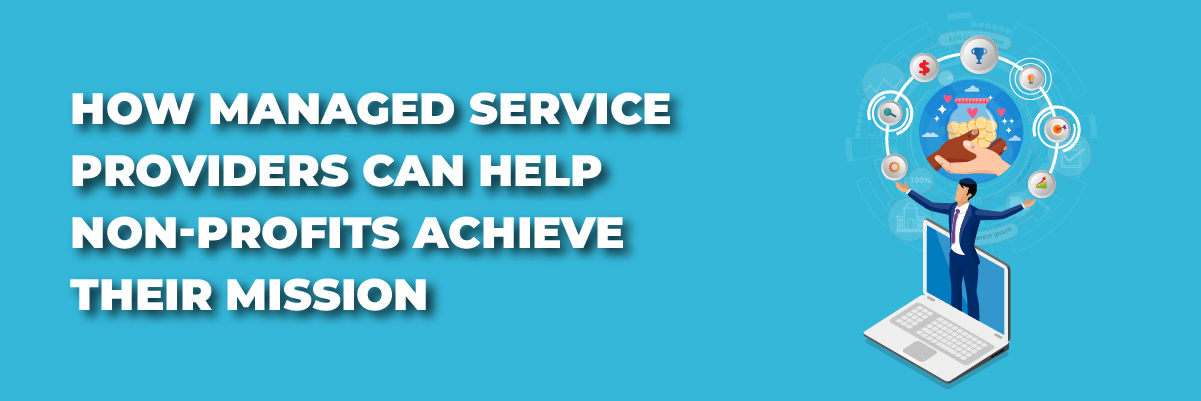How MSPs Can Help Non-Profits Achieve Their Mission
Non-profit organizations face a unique set of challenges as they strive to achieve their missions. While their focus is often on advancing social causes, improving communities, and driving positive change, non-profits must also contend with the complexities of modern technology, cybersecurity threats, and limited resources. One solution that is gaining widespread recognition is the use of Managed Service Providers (MSPs). In this article, we’ll explore how Managed Service Providers can help non-profits achieve their mission.
Managed Service Providers offer a range of IT solutions that allow non-profits to concentrate on their core mission while ensuring that their technology infrastructure remains secure, efficient, and scalable. By outsourcing their IT needs to an MSP, non-profits can gain access to the expertise, tools, and resources they need to thrive in a competitive environment.
Understanding the Role of Managed Service Providers
Managed Service Providers are third-party companies that remotely manage an organization’s IT infrastructure and end-user systems. They offer a wide range of services, including network management, cybersecurity, cloud computing, and helpdesk support. MSPs provide continuous monitoring, proactive maintenance, and rapid response to technical issues.
For non-profits, this means having a dedicated team that can manage their IT needs without the high cost of in-house staff. MSPs ensure that systems remain up and running, allowing non-profits to focus on their mission without worrying about technology failures or cyber threats.
1. Enhancing Efficiency and Productivity
One of the primary benefits of partnering with an MSP is the increased efficiency and productivity that non-profits can achieve. MSPs streamline IT operations by implementing best practices, optimizing network performance, and automating routine tasks such as software updates, patch management, and backups.
By reducing downtime and ensuring that technology runs smoothly, non-profits can operate more efficiently. Staff members can focus on their roles without being distracted by technical issues, ultimately leading to higher productivity and better service delivery to the communities they support.
2. Cost-Effective IT Solutions
Non-profits often operate on tight budgets, with limited financial resources available for large IT investments. Managed Service Providers offer scalable, cost-effective solutions that allow non-profits to pay for the services they need without overextending their budget.
MSPs provide predictable, flat-rate pricing models, which means that non-profits can avoid unexpected costs related to hardware failures, system upgrades, or cybersecurity breaches. This allows organizations to allocate more funds towards their mission-critical programs rather than IT expenses.
3. Proactive Cybersecurity and Risk Management
In today’s digital world, cybersecurity is a top concern for organizations of all sizes, including non-profits. The sensitive data that non-profits collect—whether it’s donor information, volunteer details, or community records—makes them a target for cyberattacks. Many non-profits lack the resources to implement robust cybersecurity measures on their own.
Managed Service Providers offer proactive cybersecurity solutions that protect non-profits from evolving cyber threats. MSPs can deploy firewalls, encryption, anti-virus software, and intrusion detection systems to safeguard data. They also conduct regular security audits and vulnerability assessments to identify and fix potential weaknesses.
By providing continuous monitoring and rapid response to potential breaches, MSPs help non-profits minimize the risk of data loss or reputational damage. This proactive approach ensures that non-profits remain compliant with data protection regulations and can safely serve their communities.
4. Scalable Cloud Solutions for Growth
Cloud computing has revolutionized the way organizations operate, offering flexibility, scalability, and cost savings. For non-profits, cloud solutions provided by MSPs can make a significant difference in how they manage their operations.
MSPs can assist non-profits in migrating to cloud-based systems, which allows for easier collaboration among staff, volunteers, and donors. Cloud solutions also enable remote work, an increasingly important consideration in today’s global landscape. Furthermore, cloud storage offers a cost-effective way to store large volumes of data without the need for expensive on-premise infrastructure.
As non-profits grow, their technology needs will evolve. MSPs provide scalable solutions that can grow alongside the organization, ensuring that they have the resources needed to expand their impact without being constrained by outdated technology.
5. Access to Advanced Technology and Expertise
One of the challenges non-profits face is staying current with the latest technological advancements. Many non-profits lack the in-house expertise to implement cutting-edge solutions that could drive efficiencies or enhance service delivery.
By partnering with an MSP, non-profits gain access to a team of IT professionals with expertise across a wide range of disciplines. These experts can recommend and implement the most appropriate technologies for the organization’s needs, ensuring that non-profits remain competitive and effective in their mission.
 6. Supporting Remote and Hybrid Workforces
6. Supporting Remote and Hybrid Workforces
The global pandemic has accelerated the shift toward remote and hybrid work environments. For non-profits, this presents both opportunities and challenges. Managing a dispersed workforce while maintaining communication, security, and productivity can be difficult without the right tools and infrastructure in place.
MSPs offer remote IT support, ensuring that staff members can access necessary resources, collaborate securely, and troubleshoot any technical issues regardless of their location. With managed IT services, non-profits can adapt to changing work environments without sacrificing efficiency or security.
7. Streamlining Donor and Volunteer Management Systems
Donor and volunteer management are critical aspects of any non-profit’s success. However, managing these systems can be complex and time-consuming, particularly for organizations with limited IT resources. MSPs can implement and maintain donor management software, CRM systems, and volunteer portals that simplify tracking, reporting, and engagement.
By ensuring that these systems are integrated and running smoothly, MSPs help non-profits build stronger relationships with their donors and volunteers, ultimately increasing fundraising efforts and volunteer participation.
8. Ensuring Compliance with Regulations
Non-profits must comply with various regulations, including those related to data protection, financial reporting, and grant management. Failing to comply can result in fines, loss of funding, or reputational damage. MSPs help non-profits stay compliant by implementing systems that meet regulatory standards and providing ongoing monitoring to ensure compliance is maintained.
From ensuring secure payment processing to safeguarding sensitive donor data, MSPs offer the tools and expertise needed to navigate the complex regulatory landscape.
9. Supporting Non-Profits During Disaster Recovery
Disasters, whether natural or man-made, can disrupt a non-profit’s ability to operate. Whether it’s a cyberattack, hardware failure, or physical disaster, non-profits need a robust disaster recovery plan in place to ensure that they can continue to serve their communities in times of crisis.
MSPs offer disaster recovery solutions that include data backups, cloud storage, and rapid recovery protocols. These measures ensure that non-profits can quickly restore operations, minimizing downtime and ensuring continuity of service.
10. Focusing on the Mission, Not IT Issues
Ultimately, non-profits exist to serve their communities and make a difference in the world. Managed Service Providers allow non-profits to focus on their mission, rather than spending valuable time and resources managing IT issues. By partnering with an MSP, non-profits can access the technology, support, and expertise they need to drive positive change without being distracted by technical challenges.
Choosing the Right Partner
One of the top Managed Service Providers in the U.S., Protected Harbor specializes in helping non-profits and organizations across various industries achieve their mission through tailored IT solutions. With a commitment to excellence, security, and customer satisfaction, Protected Harbor offers comprehensive services that ensure non-profits can operate efficiently, remain secure, and focus on their core objectives.
At Protected Harbor, we understand the unique challenges faced by non-profits, and we’re here to provide the expertise and support you need to thrive. Whether you’re looking to enhance your cybersecurity, streamline your operations, or scale your organization, our team is ready to help. Contact us today to learn more about how we can support your mission.






